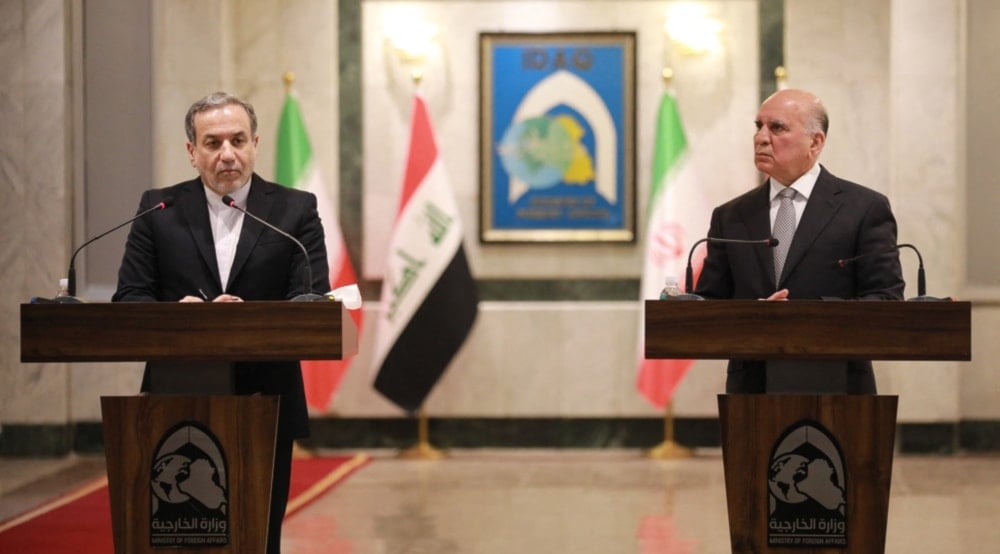Iran ready for war, committed to peace in Gaza, Lebanon: Araghchi
Iran and Iraq are in agreement on the urgent need to stop "Israel's" "crimes and aggression" and establish a ceasefire in Gaza and Lebanon.
-

Iranian Foreign Minister Abbas Araghchi (L) and his Iraqi counterpart Fuad Hussein attend a joint press conference in Baghdad on October 13, 2024. (AFP)
Iranian Foreign Minister Abbas Araghchi stated on Sunday that Tehran is fully prepared for a "war situation" while simultaneously working towards establishing peace in Gaza and Lebanon. His remarks came during a joint press conference with Iraqi Foreign Minister Fuad Hussein in Baghdad, where both diplomats stressed the urgent need to end Israeli aggression in the region.
"We are fully prepared for a war situation. We are not afraid of war, but we do not want war, and we will make efforts for a just peace in Gaza and Lebanon," Araghchi said, reaffirming Iran's position. "The Islamic Republic of Iran does not seek an escalation of tension, conflict, and war, although it is ready for any situation. We are prepared for war as we are prepared for peace."
Araghchi stressed the growing danger of a wider conflict, noting that "Israel’s" actions are the root cause of the escalating violence. He warned that the situation, which began in Gaza, has now spread to Lebanon and could extend to other regional countries, putting the entire region at risk of a widespread war.
Iran and Iraq are in agreement on the urgent need to stop "Israel's" "crimes and aggression" and establish a ceasefire in Gaza and Lebanon. Araghchi noted that his discussions with regional leaders, particularly Iraqi officials, have focused on the "dangerous and sensitive issues" in the region and the Persian Gulf, with positive consultations taking place.
Read more: US risking its troops' lives by deploying them to 'Israel': Iran FM
Hussain: 'Israel's' aggression on Lebanon could drag entire region into conflict
In his remarks, Araghchi criticized the international community for not paying enough attention to the plight of displaced people in the region, noting that "Israel’s" attacks have blocked efforts to provide aid. He reaffirmed Iran’s commitment to supporting the Lebanese people and Palestinian refugees in Syria through all available means.
Iraqi Foreign Minister Fuad Hussein expressed strong opposition to the use of Iraqi airspace for any potential Israeli attack on Iran, amid Israeli rhetoric about a possible response to Iran’s recent missile activities. "The continuation of the war and its expansion towards the Islamic Republic of Iran, and Israel's exploitation of Iraqi airspace as a corridor, is completely unacceptable and rejected," Hussein said.
Hussein further warned that "Israel’s" aggression against Lebanon could drag the entire region into conflict, noting that any war in the region would have serious consequences for regional peace and security.
Tehran is reportedly bracing for a possible response from "Israel" after reports emerged suggesting that the Israeli leadership has agreed to attack it.
The US has reportedly warned "Israel" against targeting critical Iranian infrastructure, including nuclear and oil facilities, in light of concerns that such an escalation could destabilize the region further.
Despite these "concerns", the US on Saturday expedited the transfer of the THAAD missile defense system to "Israel" in response to "increasing threats of ballistic missile attacks from Iran", Ynet reported.
Gulf states urge US to stop 'Israel' from attacking Iranian oil sites
On Thursday, three Gulf sources told Reuters that Gulf states are urging Washington to prevent "Israel" from bombing Iran's oil assets, fearing the targeting of their oil facilities by the Axis of Resistance.
Saudi Arabia, the United Arab Emirates, and Qatar are refusing to allow "Israel" to fly over their airspace for any attack on Iran and have informed Washington of this, according to three government sources.
During discussions this week, Iran warned Saudi Arabia that if "Israel" was given any aid in carrying out an assault, the Kingdom's oil infrastructure would be at risk, according to a senior Iranian official and an Iranian diplomat.
Ali Shihabi, a Saudi expert close to the Saudi royal court, divulged that "the Iranians have stated: 'If the Gulf states open up their airspace to Israel, that would be an act of war.'"
According to the diplomat, Tehran has delivered a clear warning to Riyadh that its allies in Iraq and Yemen may retaliate if "Israel" receives regional backing against Iran.
A Gulf source close to government circles told Reuters that the Iranian Foreign Minister's visit to Riyadh and the Saudi-American discussions at the defense ministry level are part of a concerted effort to handle the problem.
Read more: Middle East tensions could spark surge in oil prices; risks ahead: NYT

 4 Min Read
4 Min Read










